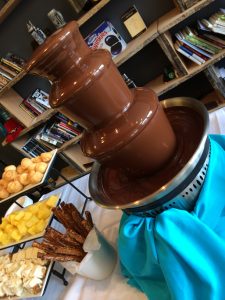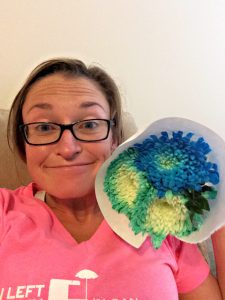Acid Reflux, Bile Reflux, and an Elimination Diet
“How long have you been experiencing acid reflux?” my dentist asked me four months ago in June.
I shrugged and shook my head. “I don’t have acid reflux,” I told him. “I would definitely know if I did.”
… Right? The doctor said to keep an eye out, and sent me home with some samples of anti-acid erosion toothpaste just in case.
That night, I woke up at 2am as I had been doing every night for two months (for reasons unknown; likely stress), and noticed a slightly bitter taste in my mouth.
Cue the lightbulb. Acid reflux. My dentist had been right.
I started keeping track of everything I ate to see if there were any particular foods that triggered the reflux, but I couldn’t seem to find a pattern. It also didn’t seem to matter whether or not I ate five hours before bed or one hour before bed. Most nights, I woke up with that awful taste.
It progressively got worse over the course of the next couple of weeks, to the point where I would wake up every night, insides ablaze, feeling like someone had stabbed me in the gut with a knife. Plus, in addition to the reflux and sleep deprivation, I was also experiencing non-stop nausea, constant fatigue, and some pretty gnarly mood swings.
I decided to cut back on acidic foods. In other words, some of my favorite things to eat and drink: chocolate (no more chocolate fountains, womp womp), coffee, wine, citrus, garlic, onions, spicy foods, and fatty foods. This helped a bit, but I still felt pretty miserable most of the time.

I did some research and decided to make an appointment with a gastroenterologist here in San Francisco. I couldn’t get a consultation appointment until early August. When I finally met with the doctor, I explained my symptoms, and he said I could have a number of things, including acid reflux, bile reflux, an ulcer, a hiatal hernia, Celiac disease, stomach cells growing in my esophagus, and more. Fun!
He suggested I schedule an upper endoscopy (read: procedure to shove a camera down my throat) so he could examine my mouth, throat, esophagus, stomach and small intestine. He said he’d also do some biopsies to make sure it wasn’t anything more serious.
I told him to sign me up right away — hell, I would have laid down on his floor for the procedure right then and there if it meant getting rid of that awful feeling — and he sort of chuckled and told me he wouldn’t be able to do the procedure for two months due to the massive number of folks in need of an endoscopy. He gave me some super strength antacids and told me to call his receptionist to bug them about cancelations because most folks are able to snag earlier appointments.
Sure enough, after a couple of weeks of incessantly calling his office, his team squeezed me in for the endoscopy at the end of August.
The procedure itself went pretty smoothly. I think I only said a few crazy things while being put under by the anesthesiologist… and since my boyfriend brought me flowers, I guess I didn’t say anything outrageous to him, either.

The overall results were part relieving, part frustrating. The gastroenterologist told me there was nothing serious wrong with me (no cancer!), but that I had a pretty bad case of bile reflux and a patulous lower esophageal sphincter. As a result, he said my esophagus and stomach were irritated and a bit inflamed by the bile that was escaping (I’ll spare you from the endoscopy photo — it was gross). He prescribed me Sucralfate to help with the bile, told me to take it twice a day as needed, and sent me on my not-so-merry-but-still-high-on-anesthesia way without many answers.
How did all of this start in the first place? How long would I be feeling crummy? How long would I need to take the pills for? How could I deal with bile reflux without the pills?
Unsatisfied, I did some more research and found a woman who specialized in integrative, holistic medicine and gastrointestinal health. I snagged an appointment with her, walked her through the events of the previous three and a half months, and gave her the results from my endoscopy.
She listened, thought for a moment, and suggested I try a hardcore elimination diet for a few weeks. She wanted me to eat only the cleanest, easiest-to-digest foods for three weeks, and slowly add foods back in one by one every four days after the initial elimination period. She also suggested I continue taking the meds the first doctor prescribed me until I had things under control.
This diet would serve two purposes. First, it would act as a hard reset for my body and digestive system; it would give them both time to heal. Second, it would help me determine whether or not I had recently developed any food allergies or intolerances.
I started the diet officially on Sunday, September 21, and took a number of supplements the second doctor recommended. I followed the diet to a T through Sunday, October 12.
The first week was a rough one. I was still nauseous and I was hungry all the time. I even stopped taking the supplements after a few days because I was concerned they were having a negative impact on my system.
The second and third weeks? Incredible. I started sleeping much more soundly, I felt more alert and energetic, my nausea went away, and my reflux was significantly reduced.

I’ve slowly been incorporating foods back into my diet these past two weeks. I’ve learned a lot about what my body can tolerate these days, and what it can’t.
At this time, I can’t eat nightshades, which includes tomatoes, potatoes, peppers, eggplant and more; I woke up in the middle of the night with a serious bout of reflux and remained nauseous for three days. I had an allergic reaction to cow’s milk, but cheese and other dairy products seemed to be okay in small doses. I can have wheat, but it makes me feel quite bloated. And thank God for small favors, but it seems I can eat beef and pork without any trouble, too.
It’s been a tremendously challenging six months. It’s not easy figuring out what’s wrong with your body while on a strict elimination diet, working full-time, and trying to maintain your sanity (and social life).
But if there’s one thing I’ve learned in telling my story, it’s that more than a dozen people in my life are suffering from similar gastrointestinal challenges. And I want to help them and others overcome these issues by continuing to share my story and healthy, elimination diet-friendly recipes.
So, dear readers, keep an eye out in the coming weeks for a detailed outline of the elimination diet, a guide to reintroducing challenge foods, and a bunch of delicious, elimination diet-friendly recipes to help make the weeks fly by.
10 Comments
Comments are closed.


Thanks for sharing! I’m looking forward to your recipes 🙂
My pleasure, Adrienne! Thanks for stopping by. 🙂
What kind of supplements did you take when you started the elimination diet?
Hi Kate! My doctor suggested I take a high dose probiotic (e.g. Jarrow’s Jarro-Dophilus 25 billion), glutamine powder (3000mg once per day), zinc (15mg per day), and a digestive enzyme with every meal (e.g. Digest Gold). I grabbed all of these at my local Whole Foods. That said, make sure you check with your doctor before starting any new supplements!
What you mean the cleanest, easiest-digest food ? What would be ?
Hey Katie,
Thank you for this post. My story is practically identical to yours, besides I started to develop dizzy and achy spells the past 6 months. But I was diagnosed with bile reflux and gerd 5 years ago. I’m curious how you would rate your daily symptoms as of this current time in your life, since this post is about 3 years ago. How is your reflux? Nausea? Etc.
Thank you so much for taking the time to right your story, it is such an encouragement.
Hi there! So sorry to hear you’ve been going through all of this – it’s never a good time. I’ve gotten my symptoms mostly under control now that I know what triggers me (nightshades, certain citrus fruits, coffee, wine, too much booze in general, etc.), but I still have flare ups if I’m stressed, eat too much, or have any trigger foods. I’ve also developed an almond sensitivity since writing this post, possibly because I consumed too many almond-based products in a short span. I hope you feel better soon. Good luck, and let me know if you have any other questions!
How are you now
Can u give more info – in same boat – taking ppi and motilium – doctor said will be for life – how do u do elimination diet – you need basic food to start with?
Help!
Hello Katie,
about 5 months ago I was up all night thinking I was going to be sick yet, I had no stomach upset and then in my foggy brain state the next morning I was still able to process enough to think…wait a minute, I know what this is…that is when I found your site and I became certain bile reflux was the issue. Since then I have eliminated dairy, wheat, night shades, chocolate :p , caffeine, citrus, wine and most processed foods.
The result is that I did loose weight right away which was actually a nice side benefit but most of all my reflux nevr bothered me that much again although I am now aware that I have had this for quite a long time but used to think I was coming down with a cold with my sore throat! My enviromental allergies are far less sensitive now but in the last two weeks someone gave me a jar of oven-dried tomatoes in olive oil…which I have almost emptied…..oh was it ever so good on rice!!! Bad idea….. I also have noticed that eggs do not sit well with me, bloating right away (we raise laying hens! :P) The best result is that I have great energy levels and way less fatigue after eating and way more awareness about eating in general.
But I am now becoming concerned however,about muscle mass. My wrists and arms are feeling thin and weak and I wonder if it is because fat cannot be well absorbed unless it is eaten with a starch. I put olive oil or coconut oil on almost everything but find it tricky when I am really busy to eat enough as not everything is easy to have on hand….any tips?
Thanks for all you do,
Louise (Dom’s wife)
Hi Katie,
I just had an endoscopy and the diagnosis was the same as yours. The doctor prescribed me also Sucralfate (and ranitidine) along with a strict diet. How long did you take the Sucralfate medicine? My doctor planned to give it to me for 8 weeks but I would rather not be on medication for too long. I know every case is different but I would be happy to know about your own experience.
Thanks! And “bravo” as we say in France for your wonderful blog and your great recipes that I will soon try!
Sylvie